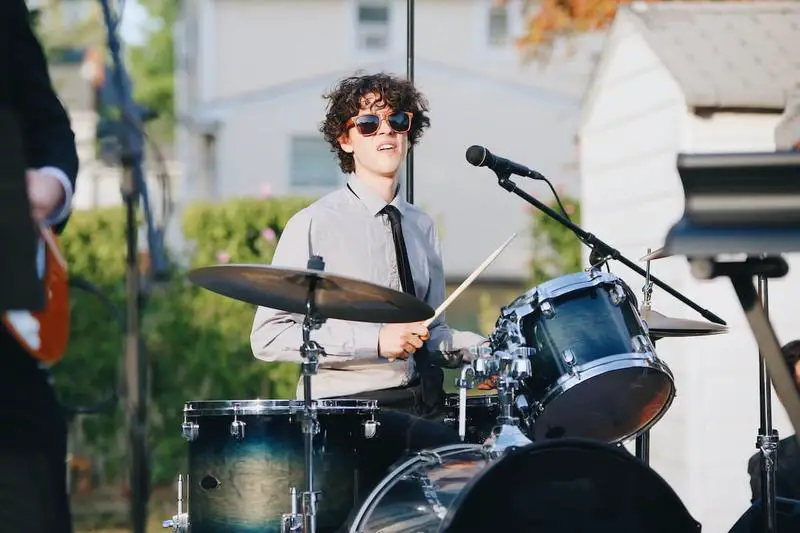How Long It Takes to Learn The Drums (For Absolute Beginners)

Learning an instrument is never a one-size-fits-all process — and that certainly includes the drums. I’ve been playing for nearly two decades now, and even after that much time, I still feel like I get a little better after each practice session.
That’s one of the beautiful things about drums. There’s always room for growth and improvement.
In today’s article, I’ll go through what factors affect your depth and speed of learning the drums and how you can best learn the instrument.
Table of Contents
How long does it take to learn how to play the drums?
Although learning the drums depends on how much practice time you put in and which techniques you work on, it generally takes around a year and half to two years. Some people can play fairly well by the one-year mark, while others can take longer to gain the motor skills and technical know-how required to play through songs consistently.
Breaking down the timeline of learning the drums
If you practice consistently, several days per week with sessions of an hour or more, you can expect linear progress.
Having your own drum set would be best, but you can also rent out time in a practice studio if you don’t have your own drum set yet. Many will even provide you with drum sticks if you don’t already have a pair.
Here’s what you can expect if you commit to learning the drums.
Three months: After three months of practice, you ought to be able to reach the most basic level of playing beats. You’ll be learning about various drumming styles and starting to understand and appreciate how the drumming of the music you listen to is actually done.
Six months: You’ll be spending the majority of your practice time on technique, such as various grips, coordination, and basic principles of drumming. You’ll learn to play a wide range of basic beats.
One year: You should be able to play most basic drum beats relatively well, and play through some basic songs.
Two years: You will be able to play well enough to consider joining a band. You may be prone to mistakes though and will struggle to play some of the more difficult beats involved.
Three years: You will be able to play through basic songs quite easily, and begin to focus on more technical beats.
Four years: You’ll really start to come into your own style and much of the work you do in practice sessions will likely be focused on creating signature beats and/or making significant progress on some of the more difficult beats you’ve heard from other drummers.
Five years: You’ll be reaching a point of proficiency that allows you to play almost any song you want after some practice, although some styles will still be quite challenging.
Six years: You can expect to be proficient in a wider range of styles, and you can comfortably play through songs across a range of genres. Your style will start being refined and you will have a wide array of signature beats.
Seven years+: You’ll have been practicing and playing long enough to easily learn songs by ear, and you’ll feel comfortable and confident in being able to play almost any beat after some practice. Advanced drummers typically have at least this amount of experience.
How beginner drummers can improve faster
"You only get better by playing." — Buddy Rich
First of all, it’s important to keep in mind that you absolutely must put in the time. Regardless of which resources you’re using to help you along, putting in the hours of practice per week is what is needed the most.
Along with doing that, here are some resources you can use to help you improve.
A drumming blog
Reading professional drummer advice will be very helpful if you’re starting out. You’ll get more personal tips that people share that you might not be able to find in other places.
Using a metronome
Using a metronome is a great idea when first starting out. It can greatly assist with your timing. This will help you to be able to keep a beat in time and help you internalize the rhythm of what you’re playing.
Playing along to songs
If you listen to a lot of music, this will help too. Playing through songs with headphones on will help you in a variety of ways, including with your timing and being able to play through an entire song from start to finish.
Learning from video tutorials
Video tutorials are one of the best ways to get free help with a musical instrument. There are many great resources that are free on websites like YouTube. You can also buy video series from other sources from professional drum instructors.
Taking drumming classes
Getting help from a professional drum teacher is definitely a great way to learn. They’ll take the time to give you feedback in real time, have you go through drills, and give input on how you can improve once you get going.
My personal top tips for new drummers
Playing the drums is easier on some days than on others. But there are some hard and fast rules I stick to when it comes to drumming that have served me well over the years. Here a few:
Try not to play when you’re low on energy
If you haven’t gotten a good night’s rest, are feeling sick, are hung over, or anything that will affect your mental clarity and physical state, it will affect your playing.
So if you can schedule your drumming on days where you know you won’t be very tired, you can expect to see better results. In turn, you should learn faster and will feel better about your abilities.
Don’t join or start a band until you’re truly ready
Playing in a band is not for beginner drummers. You should take the time to really learn your instrument before attempting to play live shows or record music.
The last thing you want is to be totally unprepared for your first show and embarrass yourself in front of a crowd. Plus, the longer you wait, the better your drumming will be.
I consider two years to be the minimum before joining a band. If you can stretch that out to three years, even better.
Trust me, you’ll be glad you waited when the time comes.
Always keep the next drum part in mind
When there are a lot of people watching, sometimes the pressure can get the best of you. It’s very distracting. And if you’re playing a show in a dark room that has a lot of flashing lights, sometimes this can be a little disorienting as well.
The best way to stay focused is to just keep thinking about what the next drum part is while you’re playing. Even if you can’t hear what the guitarist or whoever you’re playing with is doing, stay focused on what comes next and that should help to keep you from missing a beat, or worse getting lost and completely missing the transition to the next riff.
The earlier you can develop this habit, the better. Even in your first six months or year of playing, stay focused on what the next part is. Even if that’s something as basic as hitting the crash and going back to the hi-hats to lead into the next four measures.
Face the fear of performance head-on
If you get shaky hands when playing for other people, this is normal — especially for beginners. The way I like to deal with it is by transferring the sense of being watched to the other person or someone in the front row of the crowd.
I stare back until they look away. And as silly as this may sound it helps a lot to relieve some of the pressure I feel when performing in front of crowds. I usually only have to do this once right at the beginning of my set, thankfully, but it works like a charm.
Play to your current ability
When first starting out, you should focus on honing your basic skills. If you start trying to go straight into technical drumming, it will be daunting. And if you start playing for a band, don’t write drum parts to their songs that are even a little bit outside of your current playing ability.
Playing difficult drum fills or complicated beats live is much more challenging than playing them in a practice space. You wouldn’t want to put yourself in a position to make a lot of mistakes during a live performance.
Conclusion
Learning the drums depends on each music students’ individual needs. It depends greatly on how much time you invest into it, and how seriously you take it.
If you put in the time to learn all the techniques you can from the best sources possible, you can indeed become a great drummer.
Some people are naturals and pick up drums easily with regular practice, and others will struggle in beginning, but if you heed all the advice above, you’ll certainly be on the right track!
You may also like
- Top 10 Things Beginner Drummers Should Practice
- Drum Teacher Explains: Can Anyone Learn The Drums?
- The 3 Things You Should Practice On The Drums As A Beginner
- How to Practice Drums Without a Drum Set: Improve Your Skills at Home
- Best Drum Practice Pads for Beginners: Top 8 Picks in 2023
- The Best Beginner Drum Songs (And What You'll Learn)
Who we are
AboutDrumming.com is run by a group of drum teachers, drumming professionals and hobbyists. We love all things drums, and when not drumming we spend our time adding more awesome content to this website!
Free tools
You may also like
- Top 10 Things Beginner Drummers Should Practice
- Drum Teacher Explains: Can Anyone Learn The Drums?
- The 3 Things You Should Practice On The Drums As A Beginner
- How to Practice Drums Without a Drum Set: Improve Your Skills at Home
- Best Drum Practice Pads for Beginners: Top 8 Picks in 2023
- The Best Beginner Drum Songs (And What You'll Learn)
Affiliate Disclosure: When relevant AboutDrumming.com uses affiliate links (at no additional cost to you). As an Amazon Associate I earn from qualifying purchases.
